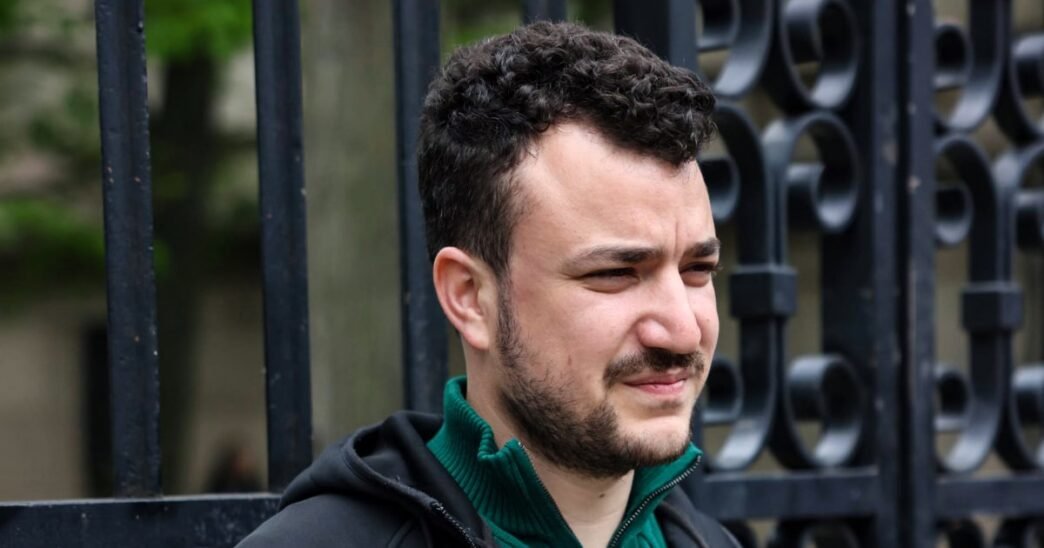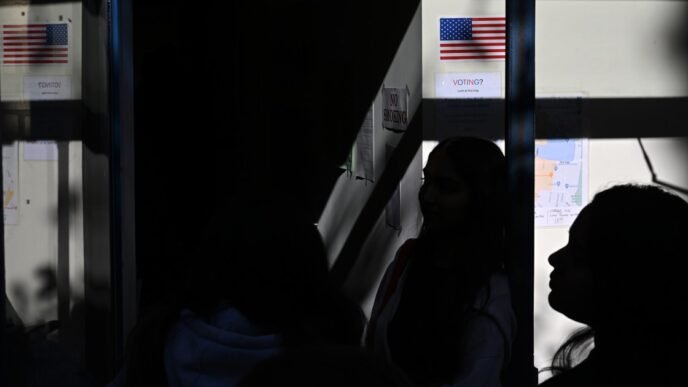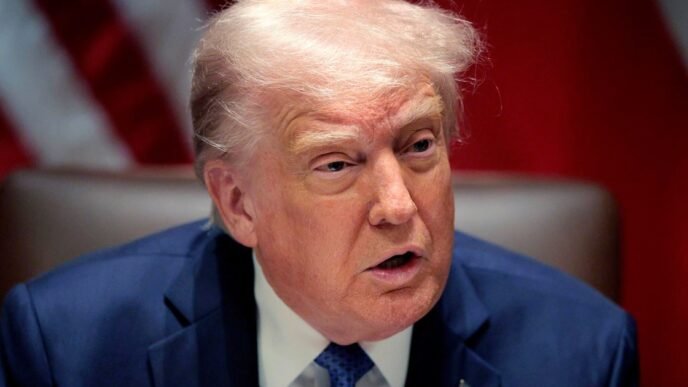Mahmoud Khalil, a pro-Palestinian activist and Columbia University graduate student who faces deportation, was detained without an arrest warrant last month, according to court documents released Thursday.
Khalil, a Syrian-born legal resident and green card holder, was arrested on March 8 after returning from an Iftar meal during Ramadan. In court documents, Department of Homeland Security attorneys state that the immigration officers “had exigent circumstances to conduct the warrantless arrest” and that Khalil said he would not cooperate and intended to leave the scene.
Federal immigration authorities said they “believed there was a flight risk and arrest was necess,” according to the court documents.
Video footage of the arrest shows Khalil cooperating with officers and telling them, “Yes, I’m coming with you.”
He remains in custody at an immigration detention facility in Louisiana.
Khalil’s wife, Noor Abdalla, who announced the birth of the couple’s first child on Monday, said in a statement three days after the arrest that ICE agents told her they had a warrant to revoke his student visa. When informed he didn’t need one, they replied that they were there to revoke his green card, Khalil’s attorneys previously said.
DHS argued in court documents submitted to the court on Thursday that it did not need to obtain a warrant before the arrest because immigration officers have the power to detain people where there is suspicion of “an offense against the United States.”
“The HSI [Homeland Security Investigations] supervisory agent believed there was a flight risk and arrest was necess,” the DHS wrote. “The agents had reason to believe that the respondent was likely to escape before a warrant could be obtained,” it continued.
Previously, DHS attorneys filed Khalil’s arrest report in immigration court, which stated that federal immigration authorities informed Khalil that they had a warrant for his arrest. At that time, he asked if he could contact his lawyer when they approached him in March.
Khalil’s attorneys, however, argue DHS did need a warrant to enter their client’s apartment building. Khalil’s legal team is calling for the case against him to be dismissed, claiming that he cooperated with authorities throughout the arrest and that no evidence has been presented to prove he was a flight risk.
“We learned for the first time that the DHS agents who arrested Mahmoud lied to him: they wrote in their arrest report that the agents told him that they had an arrest warrant, but DHS has now admitted in their filing that that was a lie and that there was no warrant at all at the time of the arrest,” Marc Van Der Hout, one of Khalil’s attorneys, said in a statement.
The Department of Justice and ICE did not immediately respond to a request for comment.
Department of Homeland Security Assistant Secret Tricia McLaughlin said Friday in an emailed statement: “Khalil was encountered by ICE officers and identified as a removable alien. When he tried to walk away, he was arrested. An administrative arrest warrant was executed at the time of his booking as is the custom.”
Khalil’s case has gained international attention as the Trump administration seeks to deport several students accused of jeopardizing their immigration status by supporting groups designated as foreign terrorist entities, such as Hamas, in some instances without providing evidence.
Documents released Thursday also show that Khalil has submitted an asylum application after an immigration judge ruled this month that he could be deported.
The Trump administration has advanced two grounds for Khalil’s removal from the U.S. since his arrest on March 8 in New York City. Khalil is currently detained in a Louisiana detention facility.
The government first cited a provision in immigration law that gives the secret of state the authority to deport someone if it is determined that the person “would have serious adverse foreign policy consequences for the United States.”
The most recent argument, which the government made public on March 23, alleges that Khalil withheld information about his membership in certain organizations and failed to disclose his employment at the Syria Office in the British Embassy in Beirut in his permanent residency application.
Khalil’s attorneys also submitted additional evidence to the court countering allegations of antisemitism, including letters from multiple Jewish classmates and professors at Columbia University who said Khalil condemned Hamas, de-escalated tense situations on campus and supported Jewish students.
The graduate student’s attorneys also denied allegations that Khalil failed to disclose his employment history and involvement in the Columbia University Apartheid Divest on his permanent residency application.
NBC News previously reported that these allegations against Khalil were partially based on unverified tabloid news reports.
Thursday’s filings were in response to a deadline the day before set by the immigration judge in Khalil’s removal case in Louisiana.
In his separate federal case, which challenges his detention, the judge requested that copies of the filings be submitted to the court, where they were made public. Khalil’s asylum application is sealed “due to the sensitive nature of the information that could affect his safety in the future,” his legal team said.
In federal court, Khalil is still seeking bail and a prelimin injunction that would release him from custody while his immigration case proceeds.













